
Aceh, officially the Province of Aceh, is the westernmost province of Indonesia. It is located on the northern end of Sumatra island, with Banda Aceh being its capital and largest city. It is bordered by the Indian Ocean to the west, Strait of Malacca to the northeast, as well bordering the province of North Sumatra to the east, and shares maritime borders with Malaysia and Thailand to the east, and Andaman and Nicobar Islands of India to the north. Granted a special autonomous status, Aceh is a religiously conservative territory and the only Indonesian province practicing Sharia law officially. There are ten indigenous ethnic groups in this region, the largest being the Acehnese people, accounting for approximately 70% of the region's population of about 5.5 million people in mid-2023. Its area is comparable to Croatia or Togo.
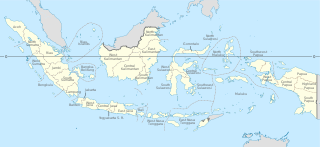
Provinces are the first-level administrative divisions of Indonesia. It is formerly called the first-level provincial region before the Reform era. Provinces have a local government, consisting of a governor and a regional legislative body. The governor and members of local representative bodies are elected by popular vote for five-year terms, but governors can only serve for two terms. Provincial governments have the authority to regulate and manage their own government affairs, subject to the limits of the central government. The average land area of all 38 provinces in Indonesia is about 50,120.23 km2 (19,351.53 sq mi), and an average population of about 7,345,233 people.

Religious police are any police force responsible for the enforcement of religious norms and associated religious laws. Nearly all religious police organizations in modern society are Islamic and can be found in countries with a large Muslim populace, such as Saudi Arabia or Iran. The responsibilities of religious police heavily vary by religion and culture. For example, the Islamic religious police prioritize the prevention of alcohol consumption, playing of music, public displays of affection, Western holidays, and prayer time absences. On the other hand, the religious police force in Vietnam are responsible for monitoring religious extremists, such as Dega Protestants or Ha Mon Catholics. As of 2012, at least 17 nations have police that enforce religious norms, according to a new Pew Research analysis of 2012 data. These actions are particularly common in the Middle East and North Africa, where roughly one-third of countries (35%) have police enforcing religious norms. As of 2012, religious police forces were not present in any country in Europe or the Americas.
Indonesia is divided into provinces. Provinces are made up of regencies and cities (kota). Provinces, regencies, and cities have their own local governments and parliamentary bodies.
Law enforcement in Indonesia is mainly performed by the Indonesian National Police (POLRI), together with other law enforcement agencies which are under the president, a certain ministry or State-owned company (BUMN) which perform policing duties for a certain public service, these law enforcement agencies are under supervision and are trained by the Indonesian National Police. The Indonesian National Police is basically the national civilian police force of the country responsible for enforcing law and order of the state.
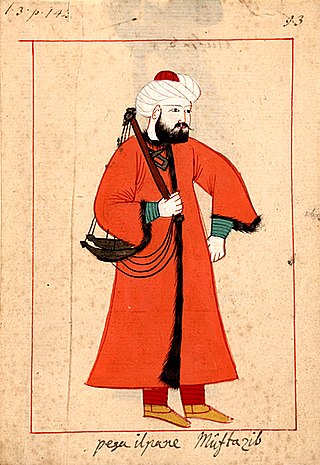
A muḥtasib was "a holder of the office of al-hisbah in classical Islamic administrations", according to Oxford Islamic Studies. Also called ‘amil al-suq or sahib al-suq, the muḥtasib was a supervisor of bazaars and trade, the inspector of public places and behavior in towns in the medieval Islamic countries, appointed by the sultan, imam, or other political authority. His duty was to ensure that public business was conducted in accordance with the law of sharia.

The Indonesian National Police is the national law enforcement and police force of the Republic of Indonesia. Founded on 1 July 1946, it was formerly a part of the country's military since 1962. The police were formally separated from the armed forces on 1 April 1999 in a process which was formally completed on 1 July 1999.
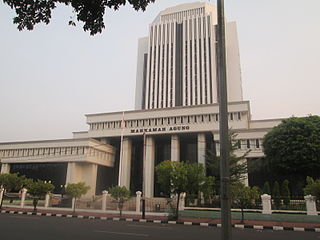
The Judiciary of Indonesia constitutionally consists of the Supreme Court of Indonesia, the Constitutional Court of Indonesia, and the lesser court system under the Supreme Court. These lesser courts are categorically subdivided into the public courts, religious courts, state administrative courts, and military courts.

The Acehnese are an indigenous ethnic group from Aceh, Indonesia on the northernmost tip of the island of Sumatra. The area has a history of political struggle against the Dutch colonial rule. The vast majority of the Acehnese people are Muslims. The Acehnese people are also referred to by other names such as Lam Muri, Lambri, Akhir, Achin, Asji, A-tse and Atse. Their language, Acehnese, belongs to the Aceh–Chamic group of Malayo-Polynesian of the Austronesian language family.

In Nigeria, Sharia has been instituted as a main body of civil and criminal law in twelve Muslim-majority states since 1999, when then-Zamfara State governor Ahmad Sani Yerima began the push for the institution of Sharia at the state level of government. A "declaration of full Sharia law" was made in the twelve states in that year, and the states created Islamic legal institutions such as a Sharia Commission, and Zakat Commission, and a hisbah, i.e. "a group expected to promote Islamic virtue, whilst discouraging vice". According to some critics, the adoption of Sharia law violates Article 10 of the Nigerian constitution guaranteeing religious freedom.

The Ministry of Foreign Affairs of the Republic of Indonesia or commonly known by its abbreviation Kemlu, is an Indonesian government ministry responsible for the country's foreign politics and diplomacy. The ministry was formerly known as the Department of Foreign Affairs until 2008 when the nomenclature changed with the enactment of the 2008 State Ministry Act.
Islamic religious police are official Islamic vice squad police agencies, often in Muslim-majority countries, which enforce religious observance and public morality on behalf of national or regional authorities based on its interpretation of sharīʿah. Modern Islamic religious police forces were first established in the late-1970s amidst the Iranian Revolution (1979) and the Islamic revival that the event brought to the Muslim world; prior, the administration of public morality in most Muslim-majority countries was considered a socio-religious matter, and was enforced through application of civil laws and/or through more informal means.
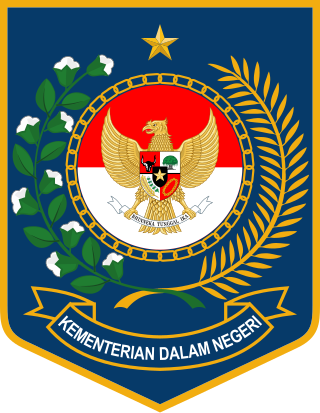
The Ministry of Home Affairs is an interior ministry of the government of Indonesia responsible for matters of the state. The ministry was formerly known as the Department of Home Affairs until 2010 when the nomenclature of the Department of Home Affairs was changed to the Ministry of Home Affairs in accordance with the Regulation of the Minister of Home Affairs Number 3 of 2010 on the Nomenclature of the Ministry of Home Affairs.

The Municipal Police Unit, are municipal police units throughout Indonesia which are under the control of the local governments of each province, city, and regency (Kabupaten). Its purpose is to assist regional heads in enforcing regional regulations and administering public order and public security, the Satpol PP is formed in every province, city, and/or regency. It is under the auspices of the Ministry of Home Affairs.

The National Counter Terrorism Agency is an Indonesian non-ministerial government department that works to prevent terrorism. BNPT is headed by a chief, who is responsible to the President. When it was first launched, the leader of BNPT held the ranking of a civil servant but the Presidential Regulation in 2012 elevated the post of BNPT Chief to the ministerial level.

The province of Aceh in Indonesia enforces some provisions of Islamic criminal law, the sole Indonesian province to do so. In Aceh, Islamic criminal law is called jinayat. The laws that implement it are called Qanun Jinayat or Hukum Jinayat, roughly meaning "Islamic criminal code". Although the largely-secular laws of Indonesia apply in Aceh, the provincial government passed additional regulations, some derived from Islamic criminal law, after Indonesia authorized the province to enact regional regulations and granted Aceh special autonomy to implement Islamic law. Offences under the provisions include alcohol consumption, production and distribution, gambling, adultery, rape, sexual harassment, certain intimacies outside marriage, and certain homosexual acts. Punishments include caning, fines, and imprisonment. There is no provision for stoning; an attempt to introduce it in 2009 was vetoed by Governor Irwandi Yusuf. In 2016 Aceh processed 324 first instance court cases under Islamic criminal law, and carried out at least 100 caning sentences.
In Indonesia, a regional regulation is a regulation that is passed by Indonesian local governments and carry the force of law in that region. There are two levels of regional regulations. Provinces pass provincial regulation, while the second tier subdivisions of Indonesia, known as regencies and cities pass regency regulation and city regulation, respectively. Each type of regional regulation is passed by the region's parliamentary body together with their chief executive.
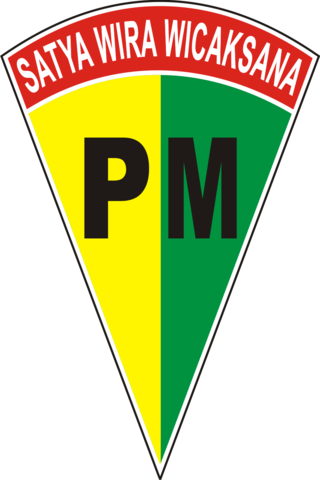
Puspomad or Army Military Police Center, which all of its personnel are part of the Military Police Corps (CPM) is one of the military general technical functions of the Indonesian Army which has the role for administering administrative assistance and as embodiment and guidance through the operation of Military Police functions. Its duties is basically to execute law enforcement towards the military which includes investigation activities and other policing duties within the scope of the army.

Mr. Sutan Mohammad Amin Nasution, also known by his birth name Krueng Raba Nasution, was an Indonesian lawyer and politician with an Acehnese–Mandailing background.

State Islamic Institute of Teungku Dirundeng Meulaboh is an Indonesian Islamic public university in Meulaboh, West Aceh Regency.















